- Home
- Peter Carey
The Tax Inspector Page 14
The Tax Inspector Read online
Page 14
They left a screech of rubber on Vernon Street that stayed there for two months. Mort was wailing with laughter, banging the wheel. Thump, thump, thump with the fat heel of his hand, and his lips now all big and loose with pleasure at the lie he had told. He grabbed Johnny’s thigh – a horse bite – and squeezed him till he yelped, and then Johnny laughed too, not at the lie, but at their shared experience, their complicity.
‘Not in his character!’
It was 100 per cent his character. That was the joke – this mild, sweet-faced boy could attack his father with a tyre lever.
‘You little bastard,’ his father said, admiringly it seemed.
They were like each other, twins, they had the same chin, the same ears, the same temper too.
He knew that when the time came, he would never be able to explain about his father – how you could want to crush him like an insect, how he was also almost perfect.
He’d drive them to wherever the Balmain Tigers were playing – 40, 60 K’s – no wuckers. He played Rock ’n’ Roll really loud – AC/DC, Judas Priest. He was the one who bought the Midnight Oil tape.
How can we sleep when our beds are burning
How can we sleep while our world is turning
He sang the words out loud. He was as good as Peter Garrett – he could have been a Rock ’n’ Roller. They ate potato crisps, hot dogs, twisties, minties, pies. At the game he did not abandon them for the bar. He was their mate. They argued and farted all the way home to Franklin. He cooked pancakes and served them up with butter and sugar and fresh-squeezed lemon juice.
He was a good father. He got up at six each morning so he could cook them a proper breakfast. He brushed their hair. He fussed over their clothes. He gave them expensive fizzy vitamins and did not over-cook the vegetables.
He was affectionate. He was never shy to kiss them on the cheek or hold them. He liked to kiss. He had soft kissing lips. And it was the lips which were the trouble, the lips that showed when things were going bad again.
Johnny looked like his Dad. Naturally this was not so interesting for their Dad to look at. Benny looked like the other person, the one they were not allowed to ask about and the bad nights always began with their father staring at Benny and looking sad. Then he would cuddle in to him and stroke his hair and kiss him on the neck. He was not ashamed of it. He said: ‘You see those other fathers, too scared to even touch their kids. They’re just terrified of natural feelings.’ He kissed them both, often, like you saw mothers kissing babies. Kissing their necks and backs.
Once he started kissing Benny’s neck, he would not stay soulful and doggy-eyed for long. Johnny could watch the mood-change coming like wind across a paddock full of wheat. His dad’s eyes would turn snaky. He’d start to talk sarcastic, spiky. He would laugh and say mean things about the shape of Johnny’s head or how fat his legs were. He did not mean them really – nasty and nice were all the same to him when his mood changed. He had only one objective: to get Johnny to leave the room so he could be alone with Benny.
Johnny slammed the door to counterfeit his exit from the house. He sat outside the blessed circle of affection, outside the blue centre of the flame, safer but more lonely, excluded but responsible. He became the ugly one. He became a peek, a sneak. He watched his father stroke Benny’s hair, waited for the moment when the mustard velvet cushion would be placed across his brother’s lap. It was then he would come in throwing darts or pillows.
Sometimes Benny just looked at him with wet open lips and a smile on his face, sometimes he needed him bad. Sometimes Mort and Benny both shouted at him, told him to piss off out of there.
The day they saw Paddles it was still seven whole years away from the night when he would smash his father’s bedroom window with a cast-iron casserole and cut him with the Stay-sharp knife.
He was not Vish yet.
He was still Johnny and when Mort said, ‘Come on, killer, I’ll buy you a quarter pounder,’ he looked at the big face and in spite of everything, was still proud to be just like his Daddy.
23
At ten-fifteen on Monday night, while Maria and Gia drove from the Blue Moon Brasserie towards the Taxation Office, Cathy stood at her open refrigerator door wondering what she could be bothered cooking; Mrs Catchprice walked along Vernon Street, Franklin, and offered to employ Sarkis Alaverdian; Vishnabarnu finished ironing Benny’s wrapping paper and began to iron his jeans.
‘I’m going to get you out of here,’ he said.
‘You never did listen to anyone but yourself, Vish.’ Benny straightened the orange plastic sheet beneath his suit and adjusted his socks once again. ‘I’m asking you to be my partner.’
‘I’ll take you out of here,’ Vish smiled. ‘If I have to pick you up and carry you out.’
‘Only problem,’ Benny lit a Marlboro and blew a long thin line towards his brother, ‘I want to be here. You want to help me, stay here with me.’
Vish put the iron on its end and folded the jeans one more time.
‘You’re a stubborn fucker, aren’t you?’ Benny said.
Vish looked up and smiled.
‘We know the truth though,’ Benny blew a fat and formless cloud of smoke. ‘You’ve got the business and the personal mixed up. The problem is you were always jealous.’
‘Oh really? Of what?’
‘Of me and Him.’
‘Benny, you hated him. You used to cry in your sleep. We were plotting to poison him with heart tablets.’
‘You were jealous of us. That’s why you went crazy. It wasn’t the business. If you want him to retire, we can do that. We can look after him. We can get him out of here.’
‘This is nothing to do with Mort.’
‘You smashed the window. You stabbed him. You have to admit you’ve got a problem with him, not with the business.’
‘I was protecting you.’
‘You want to protect me – be my partner.’
Vish had that red-brown colour in his cheeks. His neck and shoulders were set so tight – if you touched him he would feel like rock.
‘Benny, I’m not coming back. O.K.? Never, ever.’
Benny laughed but he felt the sadness, like snot, running down his throat. He did not say anything. He could not think of anything to say.
Vish folded the jeans and laid them carefully beside the bottled brown snakes Benny had rescued from his Grandpa’s personal effects. He took the AC/DC T-shirt and smoothed it against his broad chest. ‘You should have washed them first,’ he said.
‘I’m never going to wear them again,’ Benny said.
He waited for Vish to ask him why. But Vish was a Catchprice – he was never going to ask. He just kept on ironing, with his big square face all wrinkled up against the steam.
After a while, Benny said: ‘Aren’t you even curious?’
Vish jabbed at the T-shirt with the point of the iron.
Benny asked: ‘Do you think I look like her?’
‘Like who?’
‘Like who?’ Benny mimicked the high scratchy voice. He pulled the photograph out of the silky pocket of his suit and pushed it at his brother. Vish took it and held it up to the light.
‘Oh, yeah.’ He looked up at Benny but made no comment on his dazzling similarity.
Benny took the photo back. He put it in his pocket.
Vish said: ‘Remember the night you saw her?’ He folded the T-shirt arms over so they made a 45° angle with the shoulder, then he pressed them flat. He was grinning.
‘You saw her too,’ Benny smiled as well. ‘Who else would stand like that at the front gate at two in the morning.’
‘It could have been anyone.’ Vish folded the T-shirt so its trunk was exactly in half. When the hot iron hit it, the shirt gave off a smell like Bathurst – oil, maybe some methyl benzine.
‘It must have been her,’ Benny said. ‘Anyone gets shot with an air rifle – if they’re innocent they call the cops.’
Vish smiled.
‘Admit it �
� you think about her too.’
‘All I try to think about is Krishna.’
‘Bullshit, Johnny. What total bullshit.’ Benny said. ‘You should learn to ask questions, it’s amazing what you find out. Did you know how long it took you to get born? Ask me.’
‘You don’t know.’
‘Ten hours. You know how long it took me? It took me thirty hours. You don’t believe me, ask Cathy. The second baby should be faster but I was lying back to front. They cut our mother open to get me out. It fucked up all her stomach muscles. She got a stomach like an old woman when she was twenty, all wrinkled like a prune.’
‘And that’s why she shot you? Come on, Benny. Give up. Get on with your life.’
‘Hey,’ Benny rose from the couch, his finger pointing. ‘Forget all this shit you tell yourself about me. Forget all the bullshit stories you carry in your head.’ He straightened his trouser legs and ran his palms along his jacket sleeves. ‘What did I tell you?’
‘When?’
‘Any time.’ He held his palms out. The gesture made no sense. ‘Ever. I told you we could do this thing together. I told you I was changed. Angel. Look.’ He walked carefully along the plank to reach his brother. Then he opened his mouth for his brother to look in.
What he meant was: light. I have light pouring out of me.
‘Benny you need help.’
‘You don’t believe me,’ Benny hit his forehead with his palm. ‘You jerk-off – you’re walking away from two hundred thou a year. You don’t know what you’re doing. You don’t know where you are. Where are you?’ Benny helped him. He pointed. He pointed to the walls, the writing. He invited him to look, to read, to understand all this – the very centre of his life – but all Vish did was shrug and unplug the iron. He stood the iron end up on the bench beside the clothes and the snakes. Right behind him was the fibreglass ‘thing’ in the shape of a flattened ‘n’.
‘Where are you?’ Benny asked. ‘Answer me that.’
‘I’m in your cellar, Benny.’
‘No,’ said Benny. ‘You are inside my fucking head and I have got the key.’
All around Vishnabarnu were the names of angels. They hung over him like a woven web, a net, like a map of the human brain drawn across the walls and ceilings of the world. He knew himself a long way from God.
24
Benny greased the Monaro out of the back paddock with its lights off. He was not licensed, and the car was not meant to be driven on the road, but his father was watching a video in his bedroom and he took the Monaro out on the far side, on to the little gravel lane which ran right beside the railway tracks.
There was a path direct to the Wool Wash, and for a moment he had toyed with the idea of walking there. The path led out through the hole in the paling fence at the back of Mort’s house.
This was the path they had walked with old Cacka down to see the frogmouth owl, the path they walked together each day to go swimming down at the Wool Wash. The path went (more or less) straight across the back paddock, crossed the railway line, curved round the Council depot where a huge Cyclone fence protected nothing more than a pile of blue gravel and two battered yellow forty-four-gallon drums, cut round the edge of the brickworks clay pit and then went straight across those little hills which had once been known as ‘Thistle Paddocks’ but were now a housing estate known as Franklin Heights. The path then ran beside the eroded drive-way to the 105-room house, down into the dry bush gullies, and then out on to the escarpment where a path was hacked into the cliff wall like something in a comic strip. The path led finally to the clear waters of the Wool Wash pool.
The truth was: it was not like that any more. The path was fucked. It was cut like a worm by a garden spade – new yellow fences, subdivisions, prohibitions, walls, new dogs, shitty owners with psychotic ideas about their territorial rights, frightened lonely women who would press the panic button on their Tandy burglar alarms at the sight of a stranger climbing over their fence.
Once it had been the best thing in Benny’s life. Now it was just an imaginary line cutting through suburbia. Once he had been able to sit above the Wool Wash for hours on hot still days in summer doing Buddha grass and feeling the wind bend the trees and show the silver colour in the Casuarinas and watching the old eels making their sand-nest in the river. When everything was so bad he thought he had to die, his mind went there, to the Wool Wash, and when Tape 7 said find a river, there was only one river.
He considered the path but it was not a serious option. When his brother went off to bed, he carried his gift-wrapped clothes and his sawn-off shot gun down to the Monaro. Fifteen minutes later he came down the S’s to the Wool Wash with the tacho needle almost on the red line. He put the nose too close into the corner on the second last bend and he nearly lost it in the fucking gravel. He changed down even as he knew he shouldn’t. The tail kicked out. Fuck it. He flicked the wheels into line and and saved it. He cut a clean line across the next curve and came down into the car park at 150Ks but he was prickling hot with shame. It was such a shitty gear change.
He did two slow circuits with his quartzes on, blasting a pure white light through the cloud of clay dust his arrival had created. His four headlight beams cut like knives through the dust, illuminating the bullet-scarred, yellow garbage bins, the POLLUTED WATER signs, and twisted galvanized pipe boom gates (NO 4-WHEEL DRIVE ACCESS).
He had a 1:3 ratio first gear and he just walked the Monaro like a dog on a leash, torqued it round the perimeter of the parking area, checking to make sure there was no one here to mock what he was going to do.
The Franklin Redevelopment Region now had a hundred thousand school kids. The banks of the Wool Wash were littered with beer cans and condoms and paper cups. Petrol-heads came here to do one dusty spin-turn before screaming up through the S’s for the race back to the skid pan at the Industrial Estate. Stolen cars were abandoned here, virginities were lost, although not his. At weekends you could buy speed and crack by the gas barbecues. It was the sort of place you might find someone with their face shot away and bits of brain hanging on the bushes.
Benny drove round the edge of a metal boom gate. It bottomed out on some grass tussocks, and then he just slid it – you could feel the grass brushing along the floor beneath his feet – out of sight behind some ti-tree scrub.
When he had shut off the engine and the lights, he tucked the shot gun underneath his seat. Then he carefully removed his suit trousers and his shirt. He folded them loosely and placed them on the lambswool seat cover. He put on a T-shirt and a pair of swimming trunks and then he put on his shoes as a protection against AIDS.
Even though it was warm, the rain clouds made the night dark and his flash light was weak and yellow. He walked warily out across the empty car park to the river, carrying the ironed clothes in a red Grace Bros plastic shopping bag. The bank just here was flat and wide and treeless. When he got to where the round boulders started, he took off his good leather shoes and placed them in the shopping bag.
Benny failed every science subject he ever took, but he knew this water in Deep Creek now contained lead, dioxin and methyl mercury from the paper factory on Lantana Road. It was surprisingly cold on his feet. He could feel the poisons clinging like invisible odour-free oil slicks. They rode through the water like spiders’ webs, air through air, sticking to everything they touched. Benny moved quickly, but carefully.
He heard the sound of the approaching car when it was up on the turn off from Long Gully Road. It was a Holden. He recognized the distinctive sound of the water pump, that high hiss in the night. He hesitated, wondering whether he should go back to the car and wait but he did not want to have to walk into the poisons twice.
There was a light wind, a cool wash of air that pushed up the river like a wave and the big Casuarinas on the shore bent and made a soft whooshing noise. No matter what had changed, it still smelt like the Wool Wash – moss, rotting leaves, something like blackcurrants that was not blackcurrants, and the slightly
muddy tannin smell of the water which you could once drink, puddles full, from Cacka’s old slouch hat.
The first package was the sneakers. He had them in a shoebox now, wrapped in ironed black paper and tied with a gold ribbon. He pushed the package out into the current, following it for a metre or two with the weak beam of his torch until it was lost.
He whispered: ‘When my past is dead, I am as free as air.’
Then he squatted and pushed out the blue parcel which contained his T-shirt. It was flat and neat like a twelve-inch L.P. For a moment it seemed to mould itself like a Kraft cheese slice on to a rock, but then it was picked up and although it was lost to sight Benny thought he could hear the sound of its paper skin brushing over the shallow rapids downstream.
He said: ‘When my past is cleared, there is only blue sky.’
The Holden was coming through the S bends above the river. He could see its lights as they cut out into the air. The car was burning oil and the lights cut back and shone white in the smoke of its own exhaust.
He hurriedly launched the gold parcel, throwing it a little carelessly so that it landed thin edge in and sank a little before it surfaced.
He spoke quickly: ‘My past is gone and I am new – born again – my future will be wrapped with gold.’
He stepped off the rock. He tried to put a shoe on, but he could not get his foot into it. The leather stuck on his wet skin. He leaned over to fix it. Then his ankle twisted and he stumbled. The Holden was through the last bend. Benny picked up the shoe and ran barefoot. Death was everywhere, but no way was anyone going to see him doing rituals in his underwear. The earth was alive with organisms which wished to make a host of his blood. He felt cuts, nicks, toxins, viruses. The car – a fucking taxi! – was driving right down to the water’s edge. He fled the beam of its lights and ran to his car. He got in, locked the doors, sat the shot gun across his lap.
The taxi did not stay long. As soon as it began its ascent through the S’s he dressed, and backed the Monaro out into the centre of the car park. When he turned to head back to Franklin, he saw, in the halogen-white glare of the headlights – Granny Catchprice. Her legs were apart. Her left hand was shading her eyes.

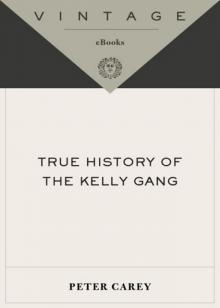 True History of the Kelly Gang
True History of the Kelly Gang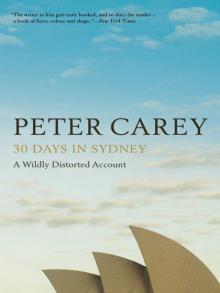 30 Days in Sydney: A Wildly Distorted Account
30 Days in Sydney: A Wildly Distorted Account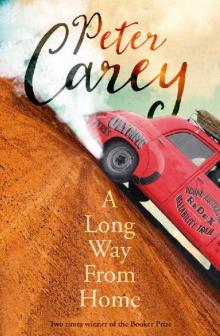 A Long Way From Home
A Long Way From Home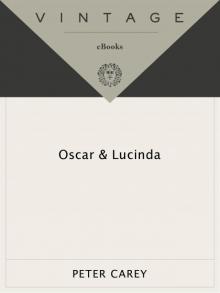 Oscar and Lucinda
Oscar and Lucinda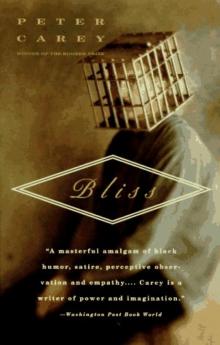 Bliss
Bliss Wrong About Japan
Wrong About Japan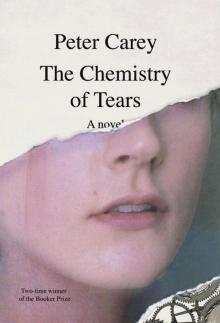 The Chemistry of Tears
The Chemistry of Tears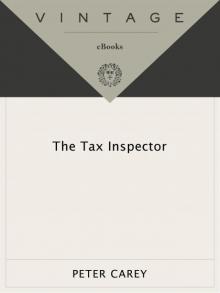 The Tax Inspector
The Tax Inspector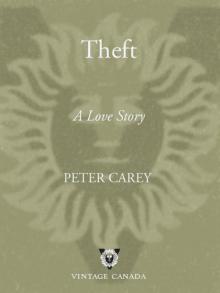 Theft: A Love Story
Theft: A Love Story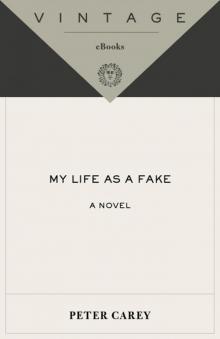 My Life as a Fake
My Life as a Fake Collected Stories
Collected Stories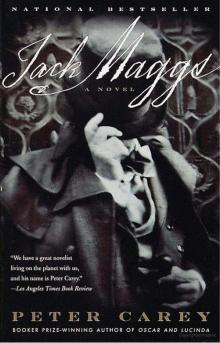 Jack Maggs
Jack Maggs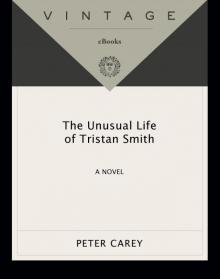 The Unusual Life of Tristan Smith
The Unusual Life of Tristan Smith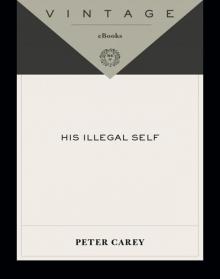 His Illegal Self His Illegal Self His Illegal Self
His Illegal Self His Illegal Self His Illegal Self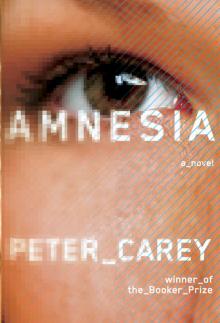 Amnesia: A Novel
Amnesia: A Novel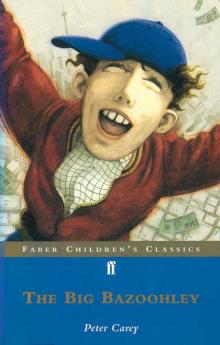 The Big Bazoohley
The Big Bazoohley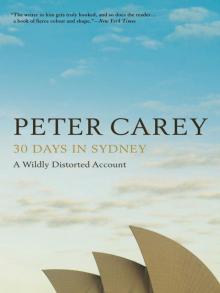 30 Days in Sydney
30 Days in Sydney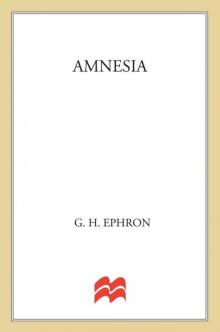 Amnesia
Amnesia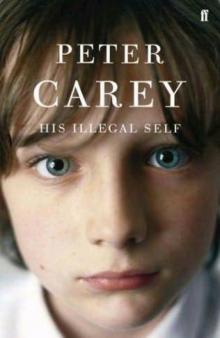 His Illegal Self
His Illegal Self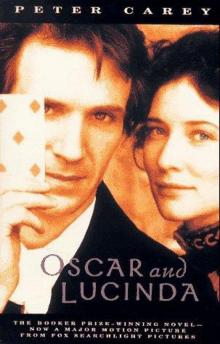 Oscar and Lucinda bw-1988
Oscar and Lucinda bw-1988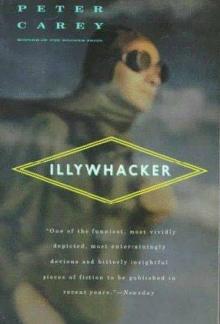 Illywhacker
Illywhacker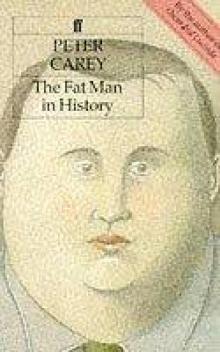 The Fat Man in History aka Exotic Pleasures
The Fat Man in History aka Exotic Pleasures